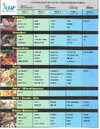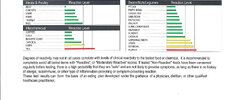meadow_wind
Jedi Council Member
In regards to the last session's discussion about Diets, Raw Milk, Beef vs Pork protein, Sprouts, etc.
Has anyone done an MRT food sensitivity test? MRT stands for Mediator Release Test.
What was your experience in regard to that type of test? Did the elimination/reintroduction program work for you?
For anyone curious about this, I attach scans of my test and some FAQ pages from the document coming with it.
I did one in 2015 by the company LEAP (lifestyle eating and performance), so the results might no longer be 100% accurate, but it can still serve as a guideline. My test shows that the meat I least react to is Beef. Chicken, lamb, and porc are still in the Green zone, but lightly reactive. Eggs are quite borderline and should be eaten in moderation.
I wonder how much this is a factor within the C's answer regarding diets?
I guess it's included but not limited to since they said: "Genetics plays a role along with the ability to manage the information."
And I don't understand why sprouts would be bad for us when, for example, the benefits of alfalfa have been confirmed in another session and the benefits of wheat grass juice in another thread.
Here's the latest Session quote related to this topic:
Has anyone done an MRT food sensitivity test? MRT stands for Mediator Release Test.
What was your experience in regard to that type of test? Did the elimination/reintroduction program work for you?
For anyone curious about this, I attach scans of my test and some FAQ pages from the document coming with it.
I did one in 2015 by the company LEAP (lifestyle eating and performance), so the results might no longer be 100% accurate, but it can still serve as a guideline. My test shows that the meat I least react to is Beef. Chicken, lamb, and porc are still in the Green zone, but lightly reactive. Eggs are quite borderline and should be eaten in moderation.
I wonder how much this is a factor within the C's answer regarding diets?
I guess it's included but not limited to since they said: "Genetics plays a role along with the ability to manage the information."
And I don't understand why sprouts would be bad for us when, for example, the benefits of alfalfa have been confirmed in another session and the benefits of wheat grass juice in another thread.
Here's the latest Session quote related to this topic:
(Keyhole) Considering this research, is raw cow's milk good for most people?
A: No.
Q: (Joe) Is it good for some people?
A: Yes. Note that children were specifically mentioned. Milk is a neonatal nutrient designed to promote growth. In the natural world creatures no longer consume milk after weaning. In some cultures, as mentioned, adults appear to do well with dairy products. What is not apparent is the adaptation and the weeding out of those who did not survive so well.
Q: (L) So, you're saying that in this group that Weston Price mentions, ‘traditional cultures who consumed an abundance of dairy, appeared to be in good health and lived disease free’... Those were individuals who had basically adapted, and anybody in their cultural group from previous generations who could not adapt basically died off, and only left alive those people who were tolerant. Is that it?
A: Yes.
Q: (L) And it said, ‘42 studies demonstrating that consumption of raw milk in childhood confers substantial protection against the development of immune disorders’. And that's with raw milk.
A: Yes but there are still dangers. Remember that milk is growth promoting. If the individual is not fully adapted, that growth promotion can take unpleasant directions.
Q: (Andromeda) It's also growth promoting for a specific type of animal, right? Each different type of milk?
A: Yes. The growth schedule of a cow or goat is very different from a human being.
Q: (Joe) So, when you say ‘the growth promotion can take unpleasant directions’, are you talking about things like cancers or any kind of malignant... (Gaby) or strokes…?
A: Yes. Milk protein aggregates if not properly digested. A cow has several stomachs.
Q: (Joe) So, in that case then, is raw milk more dangerous than pasteurized milk? Does pasteurization inhibit the...?
A: No, that is not the issue. Milk can be used medicinally with benefits for very short periods for some people.
Q: (Chu) And they spelled ‘very short’ more slowly, as if they were stressing it.
Q: (Gaby) There are two main kinds of casein proteins in cow's milk, A2 beta-casein and A1/A2 beta-casein (the more common kind, allegedly the result of genetic mutation usually dated to 5000 years ago), with the second kind being the most harmful for people's health. Considering this research, is there a profile of persons who might not benefit from raw cow's milk, even if hygienically sourced from a healthy cow and even if it contains mostly the ‘beneficial’ casein?
A: Most.
Q: (L) So, most people will not benefit from raw cow's milk?
A: Yes.
Q: (Chu) What kind of person benefits, then? What kind of issue are they treating that they might benefit from drinking it?
A: Genetics plays a role along with the ability to manage the information.
Q: (L) What information?
(Joe) The information contained in the protein.
(L) Is that what it is? The information in the protein?
A: Yes.
Q: (Chu) So, it's very hard to tell, basically, if it's good for you or not.
(L) Right.
A: Casein is a receiver/ transmitter like all proteins. You might say that persons with strong bovine affinity can do better with milk than others.
Q: (Gaby) Organic portals?
(L) So, the same would be true for other milks, like if you have goat affinities, or…?
(Andromeda) ...or camel affinities, or yak, or moose [laughter]?
(Joe) What about coconut?
(L) What does … coconut has nothing to do with...
(Andromeda) It's not milk! It's water.
(Joe) I like coconut. Do I have a strong affinity for a coconut? [Laughter]
(L) Is coconut milk protein?
(Joe) I don't know. No.
(L) I don't think so.
(Andromeda) Well, I definitely don't have any affinity to a cow.
(L) So, it's an iffy situation, and obviously raw milk is better than pasteurized milk. It can be used as a medicine for brief periods of time. If it's going to be consumed, it should be while they're children, because apparently children appear to benefit, even if it's cow's milk. At least better than adults. And groups of people that appear to be well adapted to milk are exactly that: adapted. Because all the people who couldn't tolerate it in their culture died off.
(Andromeda) That would've been me.
(L) Yeah, I would've died off.
(Steph_rivers) Does fermentation of raw milk help the lactic bacteria break down the casein proteins and lactose to levels that render it harmless/digestible?
A: Not really.
Q: (gottathink) Regarding raw milk and its benefits, does it make any difference if the source is goat, sheep, cow, buffalo etc.?
(L) Well, I think that's pretty much covered.
(Persej) What is the substance that Weston Price named ‘activator X’? And here's a description of the activator X: ‘He determined that neither total hours of sunshine nor temperature was the chief controlling factor' in how much activator X was present in the milk. Rather, 'the factor most potent was found to be the pasture fodder of the dairy animals. Rapidly growing grass, green or rapidly dried, was most efficient'.’ So what is this activator X?
A: Information! Note the fact that grass of a certain nature provided this. Apply that principle to foods. Studies are most often of little value because subjects are self-selecting. A truly random group is almost never seen. Weighing and measuring constituents of a substance can be indicative if the potentials of information are taken into account. This is why pork is better for advanced humans than beef or many other meats. The information of the pig is more in line with the direction of the human. The meat of the pig is composed of proteins with similar receivership capacity.
Q: (Scottie) So, eat bacon!
(Andromeda) Iberico!
(Niall) Pork is better for us than beef?
(L) Keyhole, do you have any other questions? Did you get all that?
(Keyhole) One quick question about pork. Would you be able to ask about the fatty acid composition of pork fat? Because they just said that pork is in general better than beef, but the composition of pork fat, the ratio of fatty acids has been associated with lots of chronic health issues in the research. So, could you ask them about whether consuming pork that's not been pasture fed - so, for instance, pork from the supermarket - is that still healthy for humans, given the fact that their feed changes the composition of the fatty acid, and that's thought to be a real problem, as per the research anyway?
(L) Can we break this down into simple questions? Is pork from the supermarket okay?
A: No
Q: (L) So, it needs to be pasture fed pork, basically?
A: Yes
Q: (L) So, you're basically talking about things that would be ideal conditions?
A: Yes
Q: (L) And what about the fatty acid composition?
A: If the diet is varied, that issue does not arise.
Q: (Keyhole) Sorry, a quick question. Pasture raised pork is extremely difficult to find, so what's better: beef or supermarket pork?
(L) Grass fed beef or supermarket pork. Well now you're adding another parameter to it.
A: Grass fed is better on both counts. But in absence, pork is better.
Q: (L) And just remember what they said about studies and how the subjects of studies are self-selected.
(Andromeda) Can we ask about why eggs are bad for so many of us?
(L) That's a good question. Why are eggs so bad for so many of us?
A: They are the potential young of another species with linkages to reptiles.
Q: (L) So, it's the information again?
A: Yes
Q: (L) And it's concentrated in the egg?
A: Yes
Q: (L) Just like the information about cows is concentrated in the milk?
A: Yes
Q: (Joe) Is there much information of any consequence in non-meat foods like grains and stuff like that? Is that something that should be considered from an information point of view?
A: Considered, yes.
Q: (L) Well, we know that seeds are the potential young of plants.
(Andromeda) And plants can be going one way or the other.
(L) And grains have been shown to be, you know, pretty detrimental...
(Chu) But from some veggies you get vitamins that you don't get from meat.
(L) Yeah. But veggies are different from grains. I mean there's a lot of root vegetables, leafy vegetables or fruits, all those kinds of things that do not entail eating the seeds or the potential young. So, maybe there's... Is there some kind of cosmic law about consuming the young of other creatures?
A: Close
Q: (Chu) Okay, so sprouts for example would be worse than a head of lettuce?
(L) Yeah.
(Chu) 'Cause it's a bunch of babies.
(Andromeda) It's a bunch of babies in one bite. [laughter]
(Chu) What about the cooking alterations when you fry with lard or tallow? Which one is better?
A: A mix would be ideal.
Q: (Joe) 50/50?
A: Yes
Q: (Chu) And reusing the fats is bad?
A: Yes
Q: (Andromeda) Even bacon fat?
A: No
Q: (Andromeda) I knew it!
(L) That's because it's freshly rendered.
A: Yes
Q: (Andromeda) And it's smoky. [laughter]
A: Yes
Q: (L) Okay.
(Temperance) May I piggyback on the pork feed questions? So, from what I've understood based on what I've learned about pork diets or pig diets, they're not able to survive on pasture alone. Is this true?
A: Close. Omnivores like humans.
Q: (Temperance) Okay. What is the optimal supplementation with grain to balance out their diet?
A: Avoid grain. Feed veggies etc.
Q: (Joe) And acorns.
(L) Acorns are seeds of oak trees.
(Temperance) Are they able to digest milk better than humans?
A: Yes
Q: (Temperance) Okay. I remember hearing something about people having dairy cows, then using the excess milk or excess whey to then fatten up pigs. So, I suppose that's one way to do it and I'll look to avoid grains. Thank you very much.
(Joe) Are acorn-fed pigs that we get, are they bad because they've been eating baby oak trees?
A: No.
Q: (Joe) That law doesn't apply to pigs.
A: Yes
Q: (Niall) The tree drops them freely. They're not taken from it.
(Andromeda) Where does fish fit into all of this? Fish and fish oil?
(L) Well, they already told us about that once; that fish substitute semi-adequately. Man does not live by fish alone. So, buy every piece of bacon. [laughter] So, okay, let's move on to the next questions.









